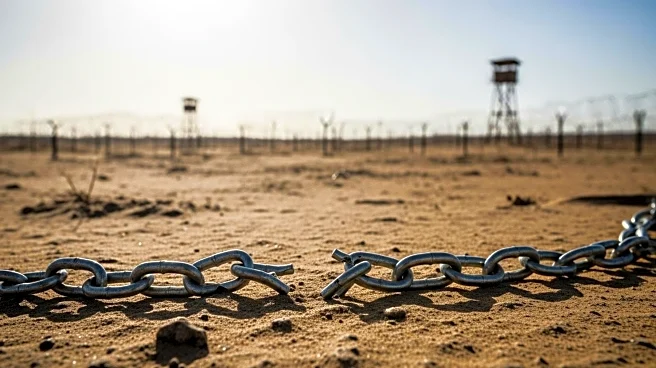What's Happening?
Migrants attempting to leave Mauritania for Europe report severe mistreatment by security forces funded by the European Union. These forces are tasked with preventing migrants from embarking on the dangerous journey across the sea. Abdramane Barry, a migrant from Sierra Leone, shared his experience of being detained in overcrowded conditions with inadequate food and water. Human Rights Watch has documented numerous abuses, including arbitrary detention and extortion, in a report highlighting the ongoing issues. Despite efforts by the EU and Mauritania to improve conditions, Barry and others have faced expulsion without legal process, leaving them stranded in conflict-ridden Mali.
Why It's Important?
The allegations against EU-funded security forces raise significant concerns about human rights violations in migration management. The EU's approach to outsourcing border control to countries like Mauritania, Libya, and Tunisia has been criticized for enabling abuses. This situation impacts the EU's reputation and its commitment to human rights, potentially affecting diplomatic relations and migration policies. Migrants, often vulnerable individuals, face dire consequences, including exploitation and violence, highlighting the need for more humane and transparent migration management practices.
What's Next?
The EU has stated its commitment to addressing allegations of mistreatment, but concrete actions remain to be seen. Human rights organizations may continue to pressure the EU for accountability and reforms. The situation in Mauritania could prompt further investigations and policy reviews. Migrants like Barry, who are left in precarious situations, may seek international assistance to return home or find safer migration routes. The EU's response and any changes in policy will be closely monitored by stakeholders and human rights advocates.
Beyond the Headlines
The treatment of migrants in Mauritania reflects broader ethical and legal challenges in global migration management. The reliance on third countries to control migration raises questions about accountability and the protection of human rights. This situation may influence long-term shifts in international migration policies, emphasizing the need for cooperation and respect for human dignity. The cultural and societal impacts on migrants, who often face discrimination and hardship, underscore the importance of addressing these issues comprehensively.










